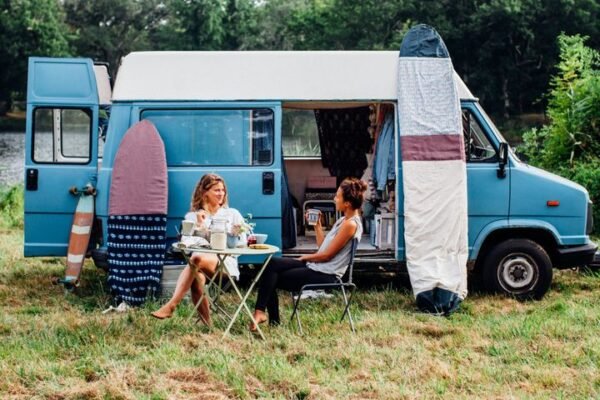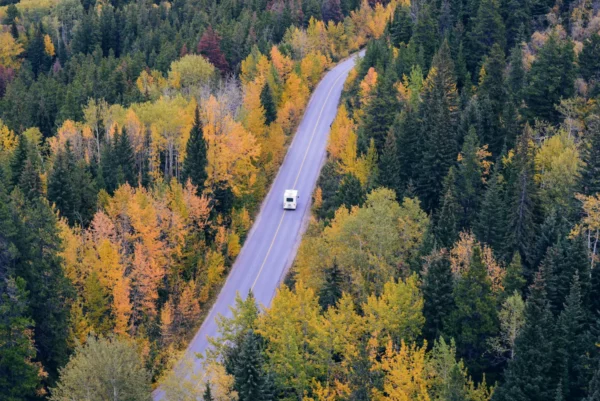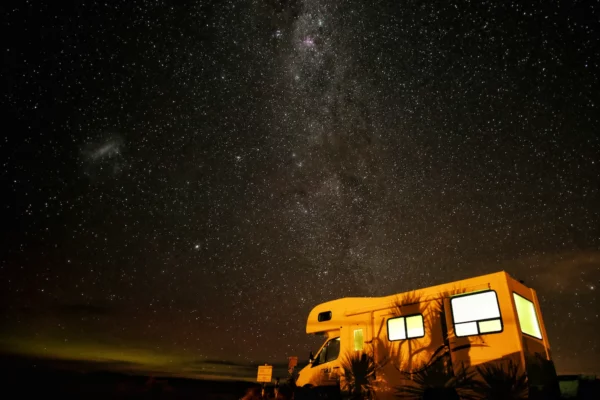
Purchasing a motorhome is often a big decision for both families and couples. When you take to the road, you’re sure to see countless motorhomes passing you by. There’s a good reason for it. The benefits are endless! For many, there’s nothing that comes close to jumping in a motorhome, hitting the open road, and getting to explore.
If you like having freedom when travelling and don’t want to fork out on hotel stays, investing in a motorhome is a no-brainer. They’re cost-effective, come with all the mod cons you desire, and allow you to spend quality time with your family. Once you’ve decided you want to invest in one, there are certain things to consider and bear in mind before splurging on one. Here are some important notes to take on board first.
Motorhome or Campervan

Firstly, you need to look into the differences between motorhomes and campervans. This will give you a better sense of what each provides. A motorhome is normally defined as a recreational vehicle built on a bus chassis or truck. Motorhomes are designed to be used as self-contained living quarters when travelling. Depending on the model, a motorhome can normally sleep between 2 and 6 people. One of the primary benefits of a motorhome is you have everything you could possibly need inside your vehicle. These include cooking and bathroom facilities and beds. In theory, you don’t even need to rely on campsite facilities.
On the other hand, a campervan is a van that’s equipped as a self-contained travelling home. They tend to be smaller than motorhomes. In the majority of campervans, there aren’t any dividing partitions between living quarters and the cab. What’s more, they normally sleep between 2 and 3 people. Campervans are compact, meaning you can drive wherever you want to, just like you would with your car. They’re easy to park and maneuverer too. Make sure to weigh up the pros and cons of motorhomes and campervans. If you’re fixed on the former, read on to find what else you need to consider before buying a motorhome.
Budget
If we’re being honest, motorhomes aren’t cheap. This means you need to have a budget in place when searching for one to ensure you can realistically afford it and all the running costs involved. Your eyes may be drawn to a particular model, but you may find you just don’t have the funds in place to foot the bill.
It’s vital that you draw up a budget before going any further. If you’re buying with your loved one, you will need to assess your finances so you can be confident you’ve got the cash for the purchase. Don’t be tempted to take out a loan to cover the cost. Instead, start putting money aside month by month for your motorhome.
New or Used
When investing in a motorhome, you need to decide whether to go for a brand new state-of-the-art one or opt for secondhand. There are benefits and drawbacks to both. For those who have money to splurge, you may like the idea of buying something new. This is because the latest motorhomes have lots of fantastic mod cons that can elevate your travels. Used motorhomes however will cost considerably less but may not be as modern.
The best thing to do is visit a motorhome showroom where you can look at new and used vehicles. Take your time to look around them and don’t hesitate to ask questions. You need to be confident you’ve chosen a motorhome that’s right for your needs and budget.
Insurance
As you would expect, because you’ll be taking your motorhome on the road, it’s going to need to be insured. When you factor in how much cash you’ve splashed on one, you’ll want to know you’ve got the right protection in place. Check out www.motorhomeprotect.co.uk/motorhome-insurance/ who offers motorhome insurance. They offer unlimited coverage across all the countries that are part of the European Union. What’s more, Motorhome Protect offers unlimited mileage cover, exclusive offers for club members, and cover of camping personal effects for up to £3,500.
Make sure you take your time when shopping for insurance. If you are smart and look in the right places, you may be able to save money on your insurance policy. Fully comprehensive motorhome insurance protects you in the event of a theft or fire. Knowing you’ve got financial cover will put your mind at ease, especially if something happens to your motorhome whether you’re on the road, parked up or it’s in storage facilities. Additionally, it’s important to consider specialized coverage for situations like semi truck repair if you’re towing a trailer or have a motorhome with unique needs. This tailored insurance ensures you have peace of mind in a wide range of scenarios, providing you with the necessary support to get back on the road.
Distance

The kind of motorhome you pick should closely align with the type of travelling you will be doing. The requirements for a short trip in your own patch can vary significantly from long periods on the roads and crossing borders frequently. If you plan to be away for many weeks or months, it is a good idea to consider how this will affect your trip. Those planning on being away for a long time should factor in how their sleeping arrangements will change over time. Sleeping in close quarters for a long period may be fine for some, but others may be after a bit of extra space. According to experts such as diesel engine repair services and truck brake system service specialists, this will also determine the repairs and maintenance you will be doing.
Have a think about the type of meals you could prepare in your motorhome. Are you fine with simple meals over a long period, or do you require more utensils and appliances to switch things up? Depending on the areas you plan to go to, there may be different requirements you’re after in your motorhome. If you want to head out into the wilderness, you need a motorhome that can hack the hills. Speak to those who already own a motorhome as they can answer any questions you may have.
Storage
This is where you’ll thank motorhome manufacturers for being so creative. It is amazing how much stuff you can fit into a relatively small space, allowing you to enjoy so many day-to-day activities. However, there are limits. You must think about storage space when buying a motorhome, especially if you plan to go away a lot and for long periods.
Some things to consider in regard to storage include hobby items. You may want to go on a fishing trip, for example, meaning you’ll need to bring along all the essentials. If you’re off on a cycling adventure, there will need to be space to house your bike. If you’re bringing the kids, you will need space for all their toys. Obviously, the more storage space you’ve got, the better. Therefore, it’s crucial you spend time thoroughly inspecting the motorhome before sealing the deal.
Campsite Fees
If you plan to go on regular trips in the UK or around Europe, you’ll need to find somewhere to park up and rest. There are many campsites across the country and Europe where you can do just that. However, this will come at a price!
Campsite fees are part and parcel of motorhome life. Before you venture out on your trip, make sure you’re fully aware of campsite fees. The amount you pay will depend on how long you’re going for and the location.
Aside from property or a family car, buying a motorhome is one of the biggest purchases you’ll make. For that reason, you’ll want to make sure you get excellent value for money and get good use out of your vehicle. Whether you plan to go on city breaks, long family holidays, or trips overseas, with the right motorhome, you will be well on your journey to having fantastic adventures around the country and world.
